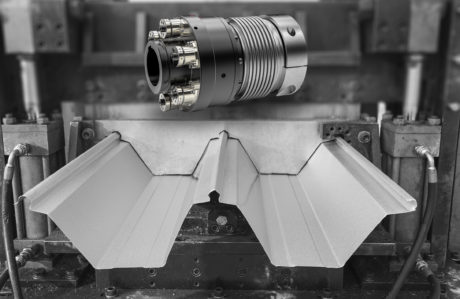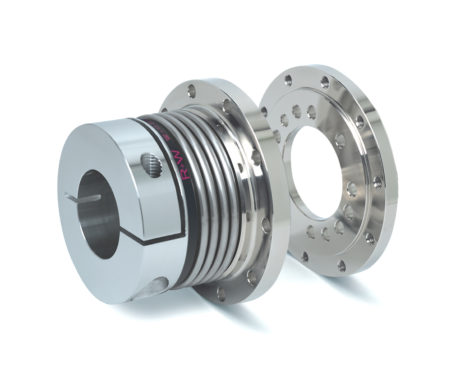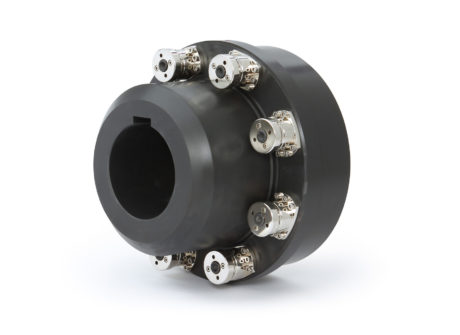R+W couplings, being strong and reliable, often turn out to be very useful in several applications of the metal industry. In processes which involve rolling, such as profiling or sheet metal production, the use of torque limiters may prove fundamental to allow a continuous and reliable functioning of the production process, preventing damages and costly downtimes.

Manufacturing profiles in a rolling mill implies driving metal sheets through rollers to turn them into profiles. In order to obtain this result, the rolls are driven by gear motors. R+W’s strong couplings provide a safe connection between motor and roller. Many companies in different industries, from automotive to furnishings, from building to engineering in general, use these profiles. The most typical products and applications of this technique include construction rails, guardrails, steel shelves and drawer runners. With respect to other plastic deformation methods, profile rolling stands out for its exceptional convenience and flexibility. Production speed can reach 200 metres per minute; this method is therefore particularly suitable for high-volume productions. The thickness of the plate is relatively constant during the production process, which distinguished this process from traditional rolling; one thing which both methods have in common is however the layout o the machines. The roller couples deform the sheets successively in different stages. Just like a traditional rolling mill, even in profile rolling the metal sheet goes through the rollers and is turned into the desired profile with all the folds that this requires. In order to ensure a constant quality of production and stability of the process – elements which are increasingly important – it is essential for the motor components to guarantee very high operating reliability and repeatability. R+W, the German multinational leader in the production of couplings, line shafts and torque limiters for industries, using its decades of experience in the metal works field, can supply a vast range of couplings to satisfy these requirements.
Installations for rolling mills
A large Asian rolling mill represented a complex challenge in this respect. In this factory a profile rolling system was derived from two folding processes. In order to connect the rollers of the two mills to the gear motors connected in series, precision couplings were required in each rolling station. The size of the couplings was however conditioned by the structure of the mills: they could not be any longer than 145 mm with an external diameter of 200 mm. In spite of these size limitations, they needed to transmit a torque value of 2.000 Nm with sufficient safety margins. As a consequence, it was necessary to design a coupling with an acceleration of 3,100 Nm and peaks of up to 5,500 Nm.

R+W’s engineers succeeded in creating a solution capable of satisfying both these requirements. With a special project based on the tested BK8/1500 metal bellows coupling, they created a solution which matched all specifications. The stainless steel metal bellows coupling designed purposely for this application practically trebled the coupling’s power density. 144 mm long and 190 mm in diameter, the coupling proved to be the perfect solution for this application.
Metal bellows couplings, such as the models in the BK8 series, are backlash-free, torsionally rigid couplings, designed for direct connections. This sturdy and compact series was originally thought of for applications in the robotics field. It allows a connection between the motor and driven parts which while torsionally rigid, may make up for lateral, axial and angular misalignments of the line shaft with low restoring force, thanks to the bellows couplings. For the connection with the gear motors, the couplings have a corresponding intermediate flange. The series is free from wear and tear and is built to last; it also ensures a reliable torque transmission, even at high speeds.
Couplings for every purpose
According to the requirements, a huge number and large variety of couplings may be used in the metal machining industry. In another rolling mill, the solution which was correctly identified by R+W’s experts was a special version of the ST1 safety coupling. In this case, a compact, torsionally rigid coupling was required, capable of ensuring a reliable torque limitation at 1,500 Nm in case of overload and at the came time make up for lateral, axial and angular misalignments between the line shafts. Couplings used in the rolling mill must be designed with easy-to-use tightening clamps to connect them to the gear motor’s lien shaft. Besides, the safety couplings needed to provide a specific flexibility to allow the predetermined torque value to be adapted to the situation if and when required.
The modular design of the couplings in the ST1 – 5 series provided the ideal conditions to satisfy these requirements. Even though they have been designed to manage direct transmissions as a standard, they can easily be teamed with additional components so as to make up for misalignments. The intelligent modular system allowed the assembly, using a flange, of a torsionally rigid bellows coupling with fixing clamps. This enabled a direct connection to the gear motors; the compensation required by the misalignment between the line shafts was provided by the metal bellows. Among other aspects, the 5 series allows an adjustment between 1,200 and 1,400 Nm, which easily allowed obtaining the limit torque value of 1,500 Nm. By means of the adjustment even in this case the ideal solution was found.
The importance of safety couplings
A fault in transmission is an occurrence that almost all managers of rolling mills must have experienced. A rolling mill’s transportation system is virtually identical in all plants: basically, an electric engine is coupled to a gear using a cog or distributor. The gear’s drive shafts are connected to the rolling mill’s engines using cardan shafts. Since gears are designed to provide greater safety with respect to the shafts, these are the weak link in the transmission line; the shafts are normally the first to break in case of overload. This implies keeping in stock cardan shafts as spare parts to reduce downtimes in case of breakage, since the delivery of this kind of shaft may take several weeks. Besides, even if the part is readily available, replacement is lengthy and a costly production downtime therefore ensues.
In these cases, the integration in the plant of a safety coupling or torque limiter represents an intelligent investment. Sometimes in new plants this solution is not adopted because it is mistakenly considered expensive, while in older plants the idea that an integration cannot be made to the machine at a later date is widespread. If the costs deriving from stocking parts and production downtimes are compared to the purchasing cost of a safety coupling, however, the use of this solution becomes evidently convenient. In most cases the coupling may be simply fitted onto existing rolling plants, instead of the standard coupling installed between the engine and the gears. In this case disc pack or claw couplings are mostly used. As an alternative, the safety coupling may also be placed on the driven side, between the gear and the cardan shaft.

Flexibility to reduce downtimes
A practical example is provided by the application created for MK Metallfolien GmbH, a rolling mill in Hagen. This company produces sheets used, among other applications, also in DPFs (diesel particulate filters) for cars. The mill, with 20 reversible rollers, produced by a US manufacturer, rolls steel between 178 mm and 380 mm wide to form a coil which is 1 mm thick when it enters the rollers and less than 0.025 mm thick after rolling. The coil is then rolled from 2,500 metres until it reaches its maximum length of 20 km. For this process the induction motor provide a nominal couple of 3,7 kNm at about 225 kW with 565 U/min and with a reduced engine speed. In the past a fault occurred leading to the breakage of the cardan shaft; even the claw coupling between the engine and the gear was damaged. Following requests to coupling manufacturers, the expected lead times were of more than 10 weeks. Such a long downtime for the whole plant would have been intolerable. Besides, within the framework of an ongoing improvement process, the company was after a solution which would have prevented such occurrences in the future.
This is when HPL Neugnadenfelder Maschinenfabrik came into play; this company provides assistance to MK Metallfolien in the domains of rolling technologies and coil production plants, as well as in all the transverse and longitudinal slitting. HPL therefore suggested the use of a safety coupling, but this type of coupling is not normally available in stock and ready to deliver. HPL however succeeded in providing its assistance thanks to R+W’s support. This partnership allowed the company to find a concrete solution in a relatively short time. In less than three weeks R+W provided a solution which replaced the old claw coupling used to connect the shafts and at the same time works as a safety mechanism in case of overload. The unusual aspect of this installation is provided by the coupling’s configuration; the chosen coupling, ST2/25, is regulated on 6,610 Nm and combined with a torsionally elastic coupling. This solution has much faster delivery times with respect to a torsionally rigid coupling. In fact, in the main transmission of rolling mills it is difficult to find elastic couplings, given the required rigidity, however in this point of the system elasticity is negligible. The elastic compensation element of this coupling has a torsional dynamic rigidity 230×103 Nm/rad. This implies a torsion which is one angular degree lower during normal functioning with a drive power of 3.700 Nm. Whether this degree of torsion could influence the finished product, was not something which could be properly evaluated beforehand. The risk was well-known to al parties concerned. However, the possibility of being able to resume production using the rolling mill several weeks earlier that what had been foreseen led to the decision of trying the coupling out. After three months working on three shifts and with about 40 incisions per week, the coupling was checked and turned out to be as good as new, exactly the same as when it was delivered. The reduced torsion angle generated by the elastic coupling does not give rise to any negative effect on the finished product, as Jörg Giersbach, technical manager for MK Metallfolien, explained.
An investment which pays off fast
Even Fa. R. Mendritzki Kaltwalzwerk GmbH & Co. KG installed a safety coupling manufactured by R+W in its rolling mill in Bochum. Even in this case, in the past several faults had occurred to the cardan shafts, due to overloads caused by the production process. The Bochum plant manufactures rolled products for may different industries. Material entering the plant is up to 300 mm wide and 10 mm thick; it is rolled at a speed of 150 m/min down to a thickness of 0,5 mm. According to Waldemar Steier, production manager, the coupling already took action several times and therefore repaid for itself more than once. The coupling installed in this case is the ST4/10 model, a safety coupling within a toothed coupling with very little backlash. Besides, following a request on the client’s part, an integrated brake disc was also supplied for the installed holding brake.
ST couplings are very much in demand for industrial applications in general, because their security function offers a great number of important advantages; these strong torque limiters protect the motor part form costly damages in case of faults and minimize downtimes. The functioning of a safety coupling is simple: if a predetermined torque value is applied to the coupling, it instantly interrupts the power flow between the motor and driven parts. This decoupling also has the purpose of stopping the residual kinetic energy produced to exert its disruptive force on the components of the transmission, which must be protected.
Just like all other R+W safety torque limiters, even the ST series is designed with clamping modules which allow dynamic coupling between the motor and driven parts of the coupling. Within these clamping modules, a sphere is axially precharged using a disc spring assembly; half of the sphere protrudes from this element and fits into a cavity on the other side of the coupling. When the peripheral force which acts on the sphere reaches a defined momentum, the sphere slips into the clamping module and the dynamic coupling is decoupled within a few milliseconds. Having eliminated the origin of the overload, all that is needed is to rotate the coupling in the right position and to apply a light axial force n the lamping module, such as, by hitting it with a rubber hammer or using a tool as a lever. Unlike shear pin couplings, widely used in the past, this coupling does not require specific knowledge or the use of other material, such as bolts, lubricants and the like. The coupling requires no maintenance.
ST safety couplings are available in different versions depending on requirements. According to the model and series chosen the standard couplings offered by the company may be available with key, flange or cone clamping, as shaft couplings for direct or indirect transmission, torsionally rigid or capable of absorbing vibrations, for torque values of up to 250.000 Nm. Besides, upon request, versions and projects are available for even higher torque values. These couplings allow modification at any time of the set limiting torque, after the application and with few manual actions.
The numerous examples described above of applications in the metal machining sector help in showing how many different factors need to be considered when a coupling is chosen and developed. To provide users with the right coupling in terms of functioning, process reliability and convenience, knowledge of the industry and its applications as well as competence in the filed of couplings and flexibility all play a crucial role. R+W works alongside designers and engineers in a vast range of industries and sectors.
R+W Italia is an ideal business partner supplying couplings, line shafts and torque limiters, both standard versions and special solutions developed upon clients’ specific requests with the aim of providing the ideal coupling for every application; the vast product range includes solutions for every requirement.








